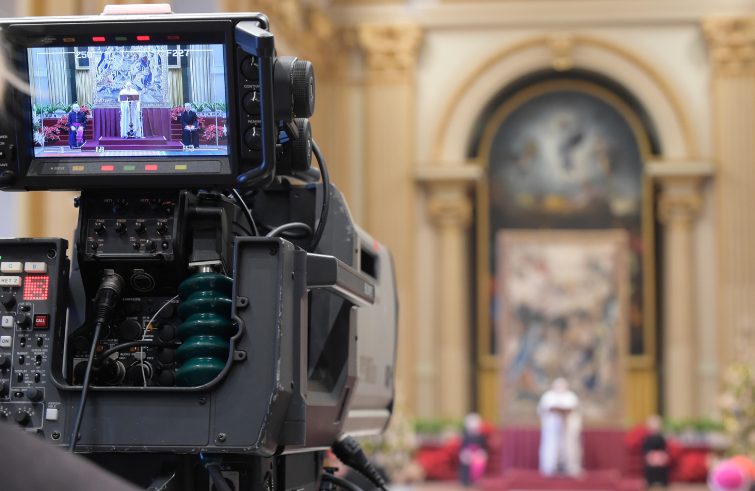
“Once we strip ourselves of our robes, prerogatives, positions and titles, all of us are lepers in need of healing. Christmas is the living reminder of this realization.” Speaking to the Roman Curia for the traditional exchange of Christmas greetings, the Holy Father denounced, “our times seem to have forgotten humility”, recommending the virtue of humility – also the subject of last Wednesday’s catechesis – to the cardinals and top Vatican dignitaries, and warning against the “dangerous temptation” of spiritual worldliness. “We cannot spend our lives hiding behind armour, a role we play, or social recognition”, Francis cautioned: “The moment comes in each individual’s life when he or she desires to set aside the glitter of this world’s glory for the fullness of an authentic life, with no further need for armour or masks.”
“Seeking those kinds of reassurance is the most perverse fruit of spiritual worldliness, for it reveals a lack of faith, hope and love; it leads to an inability to discern the truth of things”, Francis said. “How often we dream of vast apostolic projects, meticulously planned, typical of defeated generals!”, Francis exclaimed. “But this is to deny our history as a Church, which is glorious precisely because it is a history of sacrifice, of hopes and daily struggles, of lives spent in service and fidelity to work, tiring as it may be, for all work is ‘the sweat of our brow’”. “Instead, we waste time talking about ‘what needs to be done’ like spiritual masters and pastoral experts who give instructions from on high”, is the Pope’s guidance rooted in Evangelii gaudium: “We indulge in endless fantasies and we lose contact with the real lives and difficulties of our people.” Instead, “humility is the ability to know how to ‘inhabit’ our humanity without despair but with realism, joy and hope. It means recognizing that we should not be ashamed of our frailty.”
In his speech, the Pope condemned the lifestyle of the proud, “enclosed in their little world, they have neither past nor future”, and praised the lifestyle of those who are humble, who “live their lives constantly guided by two verbs: to remember and to give life.”
“Remembering does not mean repeating”, Francis pointed out with regard to a mistaken understanding of Tradition, so as not to make us “prisoners of the past.” “The humble have at heart also the future – not only the past – since they know how to look ahead, to spread their branches, remembering the past with gratitude”, Francis explained: “The humble give life, attract others and push onwards towards the unknown that lies ahead. The proud, on the other hand, simply repeat, grow rigid and enclose themselves in that repetition, feeling certain about what they know and fearful of anything new because they cannot control it; they feel destabilized because they have lost their memory.” Furthermore, the humble “allow themselves to be challenged. They are open to what is new, since they feel secure in what has gone before them, firm in their roots and their sense of belonging. Their present is grounded in a past that opens them up to a hope-filled future”: unlike the proud, “they know that their existence is not based on their merits or their good habits. As such, they are able to trust.” “Everyone is called to humility, because we are all called to remember and to give life. We are called to restore a right relationship with our roots and our branches”, the Pope’s appeal: “Without them we become sick, destined to disappear.”
Francis went on to address the synodal journey, which will see the Church engaged for the next two years:“Humility can enable us to meet and listen, to dialogue and discern,” the Pope said, cautioning against clericalism, “a perverse and present-day temptation.”
“Yet it would be wrong to think that the Synod is an event meant for the Church, as if it were something abstract and distant from us.” His guidance: “Synodality is a style to which we must be converted, especially those of us here present, and all those who serve the universal Church by their work for the Roman Curia.”
Francis then made an appeal to sobriety: “If the Gospel proclaims justice, we must be the first to try to live transparently, without favouritism or cliques. If the Church follows the path of synodality, we must be the first to be converted to a different style of work, of cooperation and communion. All this is possible only by following the path of humility.” The Holy Father entrusted to the Curia the three key words expressed in the opening speech at the Synod: participation, communion and mission, “three ways to make the path of humility a concrete path to follow in practice.”
“Relations based on personal interests create divisions, factions, enemies”,
Francis explained: “cooperation requires showing greatness in accepting our own partiality and openness to teamwork, including with those who may disagree with us. While in complicity people work together towards an external goal, in cooperation people work together because they have at heart the good of others, and thus of the entire People of God whom we are called to serve. Let us not forget the real faces of people. Let us not forget our roots and the concrete faces of those who were our first teachers in the faith.”
“The Church is called to reach out to all forms of poverty,
and she is called preach the Gospel to everyone, since all of us are poor; all of us are, in one way or another, needy”, the final appeal: “But the Church also reaches out to them because we need them: we need their voice, their presence, their questions and criticisms.”










